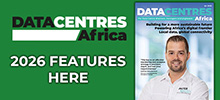13 May 2025
When ensuring success is a top priority, what should operators be most concerned about?
As increasing numbers of global players and hyperscalers hit the African data centre market, what can they do to ensure success? What are the key challenges, and how might they be addressed?
Africa’s data centre boom
The African data centre ecosystem is undergoing rapid transformation, driven by increased digitalisation, a burgeoning tech-savvy youth population, and growing demand for cloud computing and AI.
“Africa’s digital economy is accelerating faster than any other region,” says Ben Seiler, Vice President Anglophone Africa, Schneider Electric. “This growth is pushing the need for data centre infrastructure to new heights, but the challenges are equally substantial.”
With multinational corporations and local players entering the market, strategic planning is critical to ensuring sustainable, efficient, and profitable data centre operations across the continent.
“Data centres are the engine room of it all,” asserts Vertiv. “In the last few years, for example, we’ve gone from on-prem to cloud, propelled by the COVID-19 pandemic, and now we’ve got a hybrid of the two for sovereignty requirements.”

Highlighting the crucial role Internet Exchange Points (IXPs) play in fostering interconnection between networks and enabling a robust digital economy, Nurani Nimpuno, Head of Global Engagement at LINX, emphasised the benefits of partnerships and collaboration in new markets. She adds that “carrier neutral data centres play an important role in providing a neutral space for networks on the ground, and as an exchange point, we like to partner with data centres and other local players in new markets. IXPs are experts in interconnection and we come with the latest technology, but we never claim to be the expert on the ground in new locations - that’s where a good data centre partner is key.”
However, infrastructure challenges persist. Historically, Africa has faced issues with fibre infrastructure and cross-border connectivity. Many regions lack the necessary data centres, which hinders economic growth. While the entry of global players has in many ways started to solve these challenges and brought much-needed capital and expertise, it has also raised concerns about the balance between local and foreign investment, reducing local ownership and decision-making power.
“Many global players have entered the African market and struggled initially because they underestimated logistical and regulatory challenges,” confirms Selier. “Instead of building from scratch, they are acquiring established local companies to fast-track their expansion. We’re seeing issues from a design and delivery perspective. Some of the global players don’t understand the ‘African Way.’ For instance, they’re building a data centre and importing equipment, not realising that the location is landlocked. That equipment will sit there for six months if the paperwork is incorrect!”
Milivoj Uzelac, CEO of Altron Modular, echoes this concern: “Local partnerships are crucial. Without understanding the on-the-ground realities of infrastructure, regulation, and even security concerns, global firms face significant hurdles in execution.”
Selier points out that South Africa’s first co-location data centre, Teraco, was bought by Digital Realty, shifting control to Europe. Similarly, Equinix has acquired Medallion in Nigeria and MainOne, raising questions about local sovereignty, an emerging concern in the continent’s data centre strategies.
“So, our cloud is European, it’s not a local cloud. We’re losing the local touch. That’s not necessarily a bad thing, depending on the regulation and the influence that they have on government,” notes Selier.
Nimpuno advises that data sovereignty laws must foster growth rather than stifle it, advocating for policies that balance regulatory oversight with business-friendly frameworks.
“I think we’re going to see some developments in Africa with groups of countries coming together, East Africa for example, which will align and agree on data sovereignty, though these discussions are not yet mature,” notes Vertiv. “People want that formality behind decision making, and that cross border and cross region interaction. It reminds me of the mobile network operator (MNO) world back in 1997/1998, when it was all about whether you could cross the border and establish roaming agreements.”
Indeed, government support and policy frameworks play a crucial role in shaping the future of Africa’s data centre industry. Many industry experts argue that regulatory clarity, tax incentives, and streamlined business processes are essential for attracting investment. Countries like South Africa, Kenya, and Nigeria are leading the way with more proactive digital economy policies, but more needs to be done to create a harmonised regulatory framework that allows cross-border data flow and infrastructure investment.

AI workloads differ significantly from traditional data centre operations, requiring high-density computing, specialized processors, and low-latency data access. As AI begins to hit the scene in Africa, how are those in the value chain responding?
“We are just starting to see the start of AI. For us, it’s important that we make sure we have enough capacity to manage all that extra traffic and data processing,” says Nimpuno. “I think there will be a bigger impact on the data centres, which will need to make sure that they are AI-ready. At LINX, we have a lot of capacity and high margins in our network exchange points, and because of AI, we already use a lot of automation for our own technical solutions. But we’re also organizing these community meetings where operators and others come together and exchange information, and really that’s where the expertise is.”
According to Vertiv, AI is going to be incremental to the data centre: “we’re still going to see traditional growth in data centre demand, and on top of this will come AI demand, which will challenge the operators. To truly deploy AI, high power compute solutions will be needed, and if we’re going to maximize what AI can deliver, you’re going to need to look at clever ways of cooling the IT stack. Air cooling alone will not cut it, and this will impact on the power train. For example, today, 20% of the facility is occupied by power equipment and support infrastructure - but with AI and high power computing, that will expand to 80%.”
“Everything is suddenly AI; people think it will solve all problems, without considering the power, the emissions, security, etc. That’s a problem, especially for government applications,” outlines Selier.
Indeed, without advanced cooling solutions, such as liquid cooling, immersion cooling, or AI-driven thermal management systems, the increased heat output from AI-driven workloads could lead to higher operational costs, accelerated hardware degradation, and greater risks of system failures. To remain competitive, African data centres must prioritize innovative cooling technologies and sustainable energy strategies to manage the thermal impact of AI adoption effectively.
“South Africa is effectively out of power. They have more power outages than anyone else,” reports Selier. “But the minute that we get everybody to move over to liquid cooling, we reduce the footprint, the power consumption, and water intake. It solves a lot of issues. I think the only issue that we have is education, the skill set is not really there locally.”
Meanwhile, as AI ushers in a new level of heat generation - and in regions where ambient temperatures are already high - this excess heat poses a major challenge for cooling efficiency and overall energy consumption.
“In Europe, heat reuse is a massive topic due to the natural climate. Here in Africa, though, there are fewer opportunities,” says Uzelac. “I believe operators should look at the industrial zones, factories, if they want to make use of their waste heat. But of course, here it’s all about security before sustainability, so it’s not a big priority when choosing a new site location.”
Selier reports that “there’s a lot of ways that we’re utilizing waste heat across the globe. But for South Africans, I think they need to start looking at the idea of reusing it in a different way. In Paris, they’re heating Olympic swimming pools, while in Singapore – where they have more heat and more data centres than South Africa, for example – they’re doing vertical farming. Africa should look to Singapore on things like this, rather than Europe.”
A roadmap for success
The African data centre market is poised for significant growth. More acquisitions from global players are expected, alongside increased opportunities for local startups to scale their operations. One deciding factor when it comes to success is government support in infrastructure investment, streamlining regulations, and promoting public-private partnerships.
“We’ve seen all these international companies coming into South Africa, like Equinix and Vantage, as well as Microsoft with its announced US$1 billion investment in telecommunications. It gives me hope that we’re doing the right things and people are recognising its value,” explains Selier. “There is 680MW of data centre capacity coming up in the next few years. However, half the African population have no access to power, never mind internet connectivity. I’ve done projects in Ethiopia where we’ve installed internet for people that don’t have water. Similarly, so many people now have a prepaid smartphone, but no access to food! A huge divide remains, which must be addressed.”
Nimpuno adds that one key aspect of future strategies will be education and workforce development: “Africa’s young, tech-savvy population is an asset, but more training is needed to develop high-skilled engineers and IT professionals.”
Approaching the African data centre ecosystem requires a multifaceted strategy encompassing interconnection, localisation, sustainable energy, AI adaptation, and agile project management. With the right investments and policies, Africa can leapfrog into a leading global data hub, leveraging its growing digital economy to drive long-term prosperity.
“Africa is not just catching up; in some ways, it’s leaping ahead,” confirms Seiler. “We have a unique opportunity to build the data centre industry the right way from the start — efficient, sustainable, and tailored to our needs.”
As the continent continues its digital evolution, strategic investments, government collaboration, and workforce development will be the key drivers ensuring Africa’s data centre industry reaches its full potential. By embracing innovation and sustainability, Africa can position itself as a global leader in the digital economy, fostering economic growth and technological advancement for future generations.








